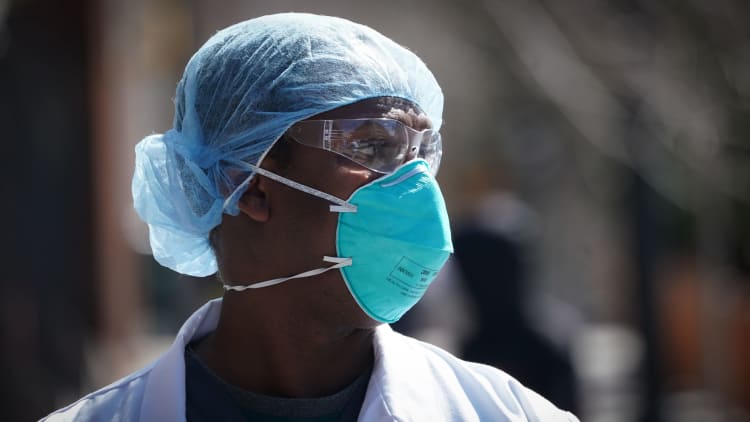You probably have a Covid-19 "bubble" and don't know it. It could be your group of close friends, your extended family members, your neighbors or even your co-workers.
A "bubble" is an unofficial term used to describe the cluster of people outside your household with whom you feel comfortable spending time during the pandemic.
The idea is that you can extend your home "bubble" to select people, so you can have more in-person social interactions beyond your household, while still potentially limiting the risk of Covid-19 transmission. It doesn't mean that you go out and resume contact with everyone you know, but rather you commit to only hanging out with certain individuals.
In New Zealand and parts of the United Kingdom, "bubbles" are encouraged.
A recent U.K. study suggests that "social bubbles can be an effective way of extending contacts beyond the household limiting the increase in epidemic risk, if managed appropriately." But the study hasn't been peer-reviewed, and it relies on mathematical models, so it's tough to say how this would play out in real life.
In truth, bubbles are still risky, because when you interact with more people, you increase your odds of acquiring Covid-19, Dr. Debbie Goff, infectious disease specialist and professor of pharmacy at The Ohio State University Wexner Medical Center, tells CNBC Make It. Staying home and limiting your face-to-face contact with people is still the best way to avoid Covid-19 spread.
"A risk for you is not just isolated to you," Dr. Anthony Fauci said in a briefing Friday. "Because if you get infected you are part, innocently or inadvertently, of propagating the dynamic process of a pandemic." New data suggests that asymptomatic young people (in their 20s, 30s and 40s) are responsible for spreading many of the new cases around the country.
And while bubbles work in the short term, "all it takes is a few people to start spreading this disease within a community, and then it rapidly spreads through families," Dr. Sandro Cinti, professor of internal medicine and infectious diseases at University of Michigan and the Ann Arbor VA, tells CNBC Make It.
Bubbles also make it more difficult to perform contact-tracing, the process in which trained personnel contact the people infected with Covid-19 and ask questions about where they've been and the people they've interacted with. Contact tracing is "not going well," Fauci said Friday.
When it comes to socializing, "everybody is approaching this differently," Goff says. Here's how experts suggest you can "bubble" safely:
Know about people's health conditions
Ask your friends or potential bubble mates if they have any underlying health conditions (such as asthma and diabetes) that could make them more susceptible to Covid-19, or put them at higher risk of severe illness from Covid-19, Goff says. Taking certain medications can also compromise people's immune system.
"You need to be respectful," Goff says. "You just don't know who those people are, because everybody isn't comfortable sharing their health with everybody else." Understand that it's better for everyone to skip socializing in-person if there are people in the group considered at-risk.
Set ground rules
About a week before you get together, have a conversation about what the expectations are for the group, Dr. Amanada Castel, professor in the department of epidemiology at the Milken Institute School of Public Health at The George Washington University, tells CNBC Make It.
You should know what precautions people have been taking, such as wearing a mask, staying home and following good hand hygiene. Communicate where you've been, including places you've traveled or protests you've attended.
Think about what you can do to minimize your risk by the time you meet up. For example, you might "try to limit your movement and do a little bit of self-quarantine before you're all going to come together," Castel says.
Make sure no one has been sick
Of course, you should absolutely stay home and not mingle with other households if you're symptomatic, Goff says. If you've been exposed to Covid-19 in the past 14 days, or if you've had close contact with someone who's had Covid-19, the Centers for Disease Control suggests you stay home for at least 14 days. People who have had Covid-19 have to be three days without a fever and 10 days without any symptoms before being with anyone else, according to the CDC.
Feel free to not 'bubble'
Even if it's your best friend in the world, you shouldn't get together with people who haven't been following proper protocol or taking Covid-19 seriously.
"Some people are like, 'Forget it, I'm not going to live my life this way, I'm doing whatever I want,'" Goff says. "That would be someone I would not personally interact with."
If you see someone posting on social media that they're going to parties or other large group gatherings, or not wearing a mask when they're out of the home, don't bubble with them, she says.
Check out: The best credit cards of 2020 could earn you over $1,000 in 5 years
Don't miss:



